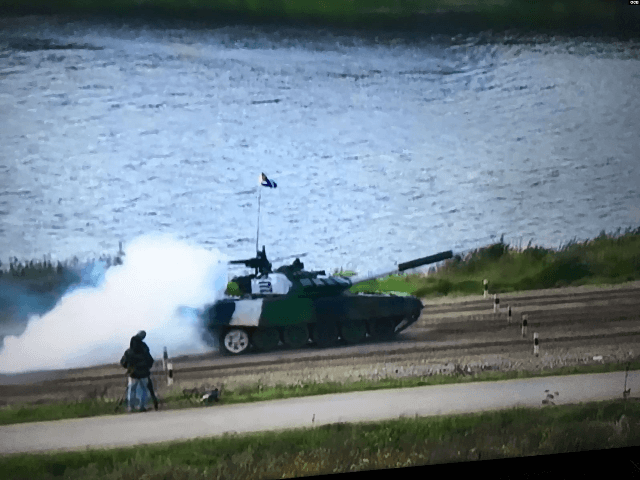Cuba’s communist regime requested help during the ongoing Russian International Army Games this week after its entry in the “tank biathlon,” an antiquated armored vehicle, broke down and began to smoke, the U.S.-based Martí Noticias reported Thursday.
The “International Army Games” are an annual competition organized by Moscow – but taking place throughout Eurasian – in which various Russian-allied rogue states compete against each other in military challenges. The competition began on August 3 and will end on August 17; finals will begin on Saturday.
“The 2019 Army Games will include 32 competitions on the territory of 10 countries (Russia, Azerbaijan, Armenia, Belarus, Iran, India, China, Kazakhstan, Mongolia, and Uzbekistan). Over 5,000 servicemen from over 200 teams will take part in the games,” the Russian Defense Ministry announced last month. The “tank biathlon” took place in the Moscow region, in a facility called “Patriot Park.”
America and France both sent observers, but are not participating, in the competition, as did Turkey, which has a long history of conflict with Russia but has recently engaged Moscow more closely, seeking closer economic ties.
According to the official website of the International Army Games, 25 nations participated in the tank biathlon, including an assorted of rogue states such as Iran, China, Syria, and Venezuela. Cuba failed to qualify for the finals along with Sudan, bested by Zimbabwe, Uganda, Burma, and Tajikistan, among others.
Cuba, competing on Tuesday, notably failed to surpass Angola, a nation it invaded in 1975, and Venezuela, a country currently occupied by close to 100,000 Cuban civilian and military officers, according to defecting Venezuelan military officials. The tank biathlon is ongoing, however, and a full list of teams going on to the semifinals and finals is still unavailable. Martí noted that both Sudan’s and Cuba’s tanks malfunctioned, however, making it impossible for them to continue.
Cuba competed against Vietnam, Angola, and Sudan. This is Cuba’s second year participating in the tank biathlon.
The Cuban military is heavily active in Venezuela and, as mentioned before, fought its last major conflict in Angola. High-ranking Cuban military officials dedicated much more of their time to managing the nation’s tourism industry than they do to war. Most of the major hotels and businesses in major tourism zones by Cuba’s beaches are run through military umbrella organizations tied to the Enterprise Administration Group (GAESA), a corporate entity owned by the Cuban military.
In a bid to restrict the Cuban communist regimes revenue streams, the Trump administration has begun targeting military-owned tourism entities for sanctions. In November, the State Department added 26 military-owned entities to the “Cuba Restricted List,” which bans Americans from doing business with them. Despite the decades-old alleged embargo on Cuba, many businesses in America welcome doing business there. The move followed repeated warnings from President Donald Trump to the communist regime to cease repressing its own people, using the military to imprison, intimidate, and otherwise harm dissidents.
The Cuban military still regularly stages drills, however, for propaganda purposes, claiming that training is necessary in the event of an American invasion. In 2017, years after President Barack Obama announced a series of policies intended to enrich the Cuban regime and bring Washington closer to it, the Cuban military broadcast military exercises in which soldiers threatened to kill Obama.
“With what fervor I would like to confront your ineptitude/to give you a cleansing with rebels and mortars/we will make you a hat out of lead [bullets] to the head,” a contingent of marching troops were shown chanting.
Since Trump became president, Havana has become more belligerent. In the immediate aftermath of the 2016 presidential election, the Castro regime announced military exercises to prepare to fight Trump. The “Bastion Strategic Exercises” are common for propaganda purposes against Republicans, first organized in the aftermath of the election of President Ronald Reagan.

COMMENTS
Please let us know if you're having issues with commenting.